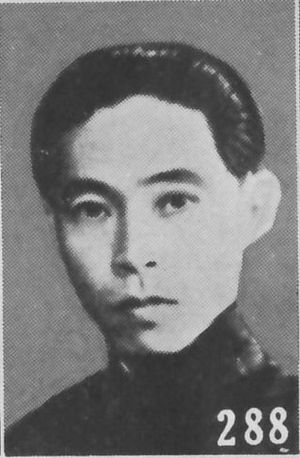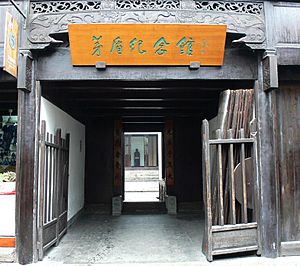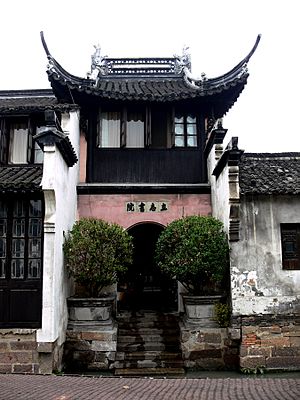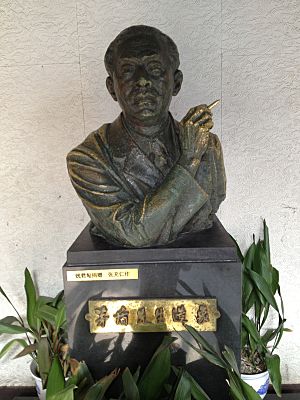Mao Dun facts for kids
Quick facts for kids
Mao Dun
|
|
|---|---|
|
茅盾
|
|

Mao Dun as pictured in The Most Recent Biographies of Important Chinese People
|
|
| Minister of Culture of the PRC | |
| In office 21 October 1949 – January 1965 |
|
| Premier | Zhou Enlai |
| Succeeded by | Lu Dingyi |
| Chairman of the China Writers Association | |
| In office 23 July 1949 – 27 March 1981 |
|
| Succeeded by | Ba Jin |
| Personal details | |
| Born | 4 July 1896 Tongxiang, Jiaxing, Zhejiang, Republic of China |
| Died | 27 March 1981 (aged 84) Beijing, China |
| Spouse | Kong Dezhi (孔德沚) |
| Relations | Shen Zemin (brother) |
| Alma mater | Beijing University |
| Mao Dun | |||||||||
|---|---|---|---|---|---|---|---|---|---|
| Chinese | 茅盾 | ||||||||
|
|||||||||
| Shen Dehong | |||||||||
| Traditional Chinese | 沈德鴻 | ||||||||
| Simplified Chinese | 沈德鸿 | ||||||||
|
|||||||||
| Shen Yanbing | |||||||||
| Chinese | 沈雁冰 | ||||||||
|
|||||||||
Shen Dehong (born July 4, 1896 – died March 27, 1981) was a famous Chinese writer. He is better known by his pen name, Mao Dun. He wrote essays, newspaper articles, novels, and plays.
Mao Dun was a very important writer in 20th-century China. He was known for his realistic stories. He even served as the Minister of Culture for China from 1949 to 1965. His most famous novel is Midnight. This book describes life in the busy city of Shanghai. It also greatly influenced his later writing. While writing Midnight, Mao Dun became good friends with another famous Chinese writer, Lu Xun.
Besides novels, Mao Dun also wrote short stories, plays, and essays. He was also famous for translating books from Western countries. He started learning about European literature when he studied at Peking University in 1913. He was one of the first people to introduce the works of Scottish novelist Walter Scott to Chinese readers. He did this through a special "Critical Biography" about Walter Scott.
He chose "Mao Dun" (Chinese: 矛盾) as his pen name. This name means "contradiction." It showed the disagreements about new ideas in China during the 1920s. His friend Ye Shengtao changed the first character to one that means "thatch."
Contents
Early Life and Education
Mao Dun's father, Shen Yongxi, taught him and planned his lessons. Sadly, his father passed away when Mao Dun was only ten years old. After that, his mother, Chen Aizhu, became his main teacher. Mao Dun often said that his mother was his "first instructor." Learning from his parents helped him love reading and writing from a young age.
He started showing his writing talent in primary school. One examiner wrote that a "12-year-old child can make this language." This shows he was a brilliant writer even when he was young.
When Mao Dun was in secondary school in Hangzhou, he read many books. He also practiced his writing skills a lot. He read classic Chinese novels and other important texts. These readings greatly influenced his writing style.
In 1913, Mao Dun joined a special three-year program at Peking University. Here, he studied both Chinese and Western literature. However, he had to leave in 1916 because his family faced money problems. He got married to Kong Dezhi soon after leaving university.
His fifteen years of education gave him strong skills in Chinese and English. He also gained a lot of knowledge about Chinese and Western literature. This prepared him for a bright future in Chinese journalism and writing.
Journalism and Writing Career
After leaving university, Mao Dun quickly found a job. He worked in the English editing and translation sections of the Commercial Press in Shanghai. When he was 21, he became an assistant editor for Xuesheng Zazhi (Students' Magazine). This magazine published many new ideas popular in China at the time.
Mao Dun also began writing his own thoughts and criticisms about society. He was inspired by the famous magazine New Youth. For example, in 1917 and 1918, he wrote articles for Xuesheng Zazhi. These articles encouraged young Chinese students to think about politics.
By the age of 24, Mao Dun was already known as a novelist. In 1920, he and other young writers took over Xiaoshuo Yuebao (Fiction Monthly). They used it to publish works by Western authors like Leo Tolstoy and Anton Chekhov. They also shared new ideas about literature. Even though he wrote in a naturalistic style, he admired writers like Tolstoy for their amazing artistic skills.
In 1920, he became the Chief Editor of Fiction Monthly. He worked to update the magazine to fit the New Cultural Movement. His writer friends helped by sending their creative works and ideas. This led to the creation of the Literary Study Group. The updated magazine was very successful. It sold ten thousand copies a month. It also introduced a new realistic approach to Chinese literature called "Literature for life." During this time, Mao Dun became a key leader of the movement in southern China.
Mao Dun left Fiction Monthly in 1923 due to disagreements. But in 1927, he became a chief writer for Minguo yuebao. He wrote many articles criticizing Chiang Kai-shek and supporting revolutions.
Political Involvement
Mao Dun was inspired by the October Revolution in Russia in 1917. He joined China's May Fourth Movement. In 1920, he joined the Shanghai Communist Team. He helped create the Communist Party of China in 1921. He worked as a link for the party and wrote for their magazine, The Communist Party.
Mao Dun also joined Chiang Kai-shek's Northern Expedition (1926–28). This effort aimed to unite China. However, he left when Chiang's Kuomintang broke ties with the Communists in 1927. In July 1928, he went to Japan for safety. When he returned to China in 1930, he joined the League of Left-Wing Writers. He actively helped resist the Japanese attack on China in 1937.
In 1949, the Communist government took power. Mao Dun became Mao Zedong's secretary and later the Minister of Culture. He held this role until 1964.
Literary Achievements
Mao Dun achieved many great things in literature. His reform of Fiction Monthly was a big step for Chinese literature. The magazine became a place for "New Literature" to spread. Many famous writers, including Lu Xun and Bing Xin, published their works there. Mao Dun supported movements like "New Literature" and "New Thinking." He believed Chinese literature should be recognized worldwide.
His experiences in politics helped him write about new topics. He helped start the League of Left-Wing Writers in 1930. He worked with Lu Xun to fight for social rights through literature. The years from 1927 to 1937 are considered his most productive writing period.
His first real novel was Shi (The Eclipse). It had three parts: Disillusions (1927), Wavering (1928), and Pursuits (1928). It tells the story of young thinkers caught in a revolution they didn't fully understand. His next big work was Rainbow (1929), known for its many characters and plot twists. In 1933, he wrote Midnight, which became very popular. It was even published in French and English. This novel explored the business world of Shanghai in detail. His stories often showed sympathy for working-class people and praised revolution. He left one work, Shuangye Hongsi Eryuehua (1942), unfinished.
After the Second Sino-Japanese War began in 1937, Mao Dun traveled a lot. He started a literary magazine in Wuhan. He also edited a newspaper's literary page in Hong Kong and worked as a teacher. After 1943, he didn't write many major works, but he still wrote articles and essays. In 1946, he visited the Soviet Union.
When the People's Republic of China was formed in 1949, he became very active. He served as Secretary and then Minister of Culture for Mao Zedong until 1964. He started the monthly magazine Chinese Literature, which became popular with Western readers. He was removed from his minister position in 1964 due to political changes. However, Mao Dun survived the Cultural Revolution and was later honored again. In the 1970s, he edited a children's magazine. He also began writing his life story, called The Road I Walked. He passed away on March 27, 1981, before finishing it.
Mao Dun's impact on Chinese literature is still felt today. He used his own money to create the Mao Dun Literature Scholarship. This fund helps encourage new writers and promote fiction.
His 50th birthday was also his 25th year as a writer. More than 500 guests, including friends from Russia and America, celebrated with him. This showed how much his influence and achievements in literature were recognized. He was also elected chairman and vice-chairman of the China Literary Arts Representative Assembly. Even when he was ill in his old age, he kept writing his memoirs.
The Mao Dun Literature Prize was created because Mao Dun wanted to encourage great novels. It is one of the most respected literature awards in China. Many famous modern Chinese writers have received this prize.
Personal Life
Mao Dun had a traditional Chinese marriage. His family arranged for him to marry into the Kong family when he was five years old. He married Kong Dezhi after he left university. After their marriage, Kong Dezhi learned new things. This helped her support Mao Dun in his writing and political work.
List of Works

Mao Dun wrote over 100 works in his lifetime. These include short stories, novels, and theories. Some of his most famous works are:
Short Stories
- Wild Rose (《野薔薇》 Ye Qiangwei) (1929)
- The Smoke and Cloud Collection (《煙雲集》 Yanyunji) (1937)
Novellas
- Disillusions (《幻滅》 Huanmie) (1927)
- Wavering (《動搖》 Dongyao) (1927)
- Pursuits (《追求》 Zhuiqiu) (1928)
- Three people walking (《三人行》 Sanrenxing) (1931)
- The Shop Of the Lin Family (《林家铺子》 Linjia Puzi) (1932)
- Spring Silkworms (《春蚕》 Chuncan) (1932)
- Autumn Harvest (《秋收》 QiuShou)
Novels
- Rainbow (《虹》 Hong) (1930)
- Midnight (《子夜》Ziye) (1933)
- Giving to the poet festival (《獻給詩人節》Xian Gei Shi Ren Jie) (1946)
Theories
- The recent works of Mao Dun (《茅盾近作》Mao Dun Jin Zuo) (1980)
- Mao Dun's comment on creativity (《茅盾論創作》Mao Dun Lun Chuang Zuo) (1980)
Essays
- "Travelling Diary of USSR" (《蘇聯見聞錄》Su Lian Jian Wen Lu) (1948)
- "Talks on USSR" (《雜談蘇聯》Ji Tan Su Lian) (1949)
Drama Script
- Front and rear Pure Brightness (《清明前後》QianMingQianHou) (1945)
Translation
- Modern drama Russian Question (話劇《俄羅斯問題》) (1946)
- Novelette Group's Son (中篇小說《團的兒子》) (1946)
Others
- Works of Mao Dun (《茅盾全集》Mao Dun Quanji) (vol. 1-15, 1984–1987)
- Introduction to the books of Mao Dun (《茅盾書簡》Mao Dun Shujian) (1st edition, collection of letters, 1984) later changed the name into (《茅盾書信集》 Mao Dun Shuxinji) (1988)
Leadership Roles
| Political offices | ||
|---|---|---|
| Preceded by none |
Minister of Culture of the PRC 1949–1965 |
Succeeded by Lu Dingyi |
| Cultural offices | ||
| Preceded by none |
Chairman of the China Writers Association 1949–1981 |
Succeeded by Ba Jin |
See also
 In Spanish: Mao Dun para niños
In Spanish: Mao Dun para niños
 | Anna J. Cooper |
 | Mary McLeod Bethune |
 | Lillie Mae Bradford |




